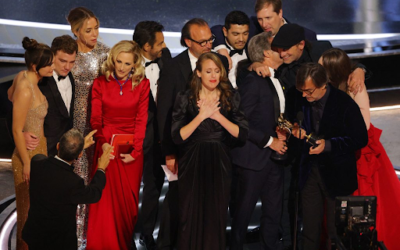Source: Deadline
The 2021 Sundance Film Festival has been quite an interesting experience to say the least, one very different from those in previous years. With the ongoing COVID-19 pandemic making it impossible to hold the festival in its traditional format while providing a safe movie-going experience, the organizers of this year’s event have had to take a new approach with the films selected for screening, showing some in drive-in theaters across the nation and making others available through online streaming. Despite these unusual circumstances though, by the time the Sundance Film Festival concludes on February 3rd, there will be several different short and feature-length films vying for distribution under the promise that receiving support from a prominent industry name will result in great critical and commercial acclaim. That seems to be enough of an incentive for one film distributor, so much so that it’s chosen to spend more money on one film in particular than what was spent on any purchase in the history of the festival.
On January 30th, 2021, tech giant Apple, which had recently entered the streaming wars with its own service Apple TV+, agreed to a deal in which they would spend a little over $25 million, more than any previous sale at the Sundance Film Festival, for the international distribution rights to “CODA”, a coming-of-age drama from filmmaker Siân Heder. For comparison, the record was previously held by last year’s $22.5 million purchase of the Andy Samberg vehicle “Palm Springs”, which was given to a joint partnership between Neon (which had distributed Best Picture winner “Parasite”) and streaming platform Hulu. Apple’s purchase of “CODA” outpaces that total by over $2.5 million, effectively taking over as record holder for biggest Sundance sale.
Given its premiere on opening night as part of the U.S. Dramatic Competition, it’s not hard to see why “CODA” would be worth spending so much money on. Starring Emilia Jones as the sole member of her family with the ability to hear, the film, inspired by the French film “La Famille Belier”, focuses on the character of Ruby and the internal conflict she faces in deciding whether or not to follow her dreams or continue to support her family’s struggling fishing business. Upon the conclusion of its premiere, “CODA” (which is an acronym for Child of Deaf Adults) was instantly greeted with overwhelming acclaim, with critics praising the film for its portrayal of people with hearing disabilities and the difficulties they and their families face when living in a world that isn’t so accommodating to their condition. With the praise growing stronger by the minute, it was not long before distributors began bidding on the film, seeing it as a possible opportunity for them to compete in the coming awards season.
As the bidding price grew larger though, more and more contenders began to drop out, and eventually, it came down to two industry giants, Apple and Amazon. Considering Amazon has already proven to be a major contender as a distributor of independent cinema (some of which has even received its fair share of awards recognition), it would not have seemed too out of nowhere for the world’s largest online corporation to come out on top. In the end however, it was Apple that had given the biggest offering, and by the end of the day, the distribution deal had been set.
Apple’s success in buying the distribution rights to “CODA” comes as a major win to the company at a time when they have needed it most. Despite being one of the world’s biggest technology corporations, Apple has not had the same success with Apple TV+ as other companies have had with their own streaming services, and a large reason for that is likely due the lack of appealing content. Although it has been able to pick up the rights to a few names here and there, such as the various Peanuts television specials, it has still fallen short in acquiring major motion pictures that might elevate their brand. Whereas competing services have been able to claim a stake in the streaming wars with their own high-profile titles (Netflix, for example, is the distributor of some of the year’s biggest awards contenders, including “Ma Rainey’s Black Bottom” and “The Trial of the Chicago 7”), Apple has had a slow start in producing or at least acquiring such titles. At the moment, only the Bill Murray/Rashida Jones comedy-drama “On the Rocks” and the animated fantasy film “Wolfwalkers” are the only Apple-distributed titles making the rounds as contenders for major awards.
For Apple to compete with the likes of Netflix and Amazon and emerge as a film distributor worthy of respect, it’s going to need to earn the distribution rights of as many titles as it can possibly get, and that will likely mean spending lots more than it has in the past. The $25 million Apple has spent for “CODA” is proof of this; the fact that Apple spent so much money on this one film, so much so that it broke a major record in the process, shows just how much the company is willing to put on the line just to get access to the one thing that could guarantee success. If Apple is willing to make such commitments to other films that are in need of distribution, one would think that it’s chances of surviving and thriving in the streaming industry, one where the competition is growing larger and harsher with each passing day, might not be as bleak as originally expected.
If there is one additional upside to Apple’s record-breaking purchase, it’s the relief in knowing that the Sundance Film Festival is still as strong as ever. With the pandemic forcing festival organizers to make drastic changes as to how its films are exhibited, there was definitely a concern that whichever titles were being included might’ve not been able to attract the attention they need so badly. If “CODA” is any indication though, that’s not the case, and with there being so many more wonderful titles making their existence known to the world, it’s safe to say that, in spite of everything, this year’s Sundance Film Festival was a complete success.




